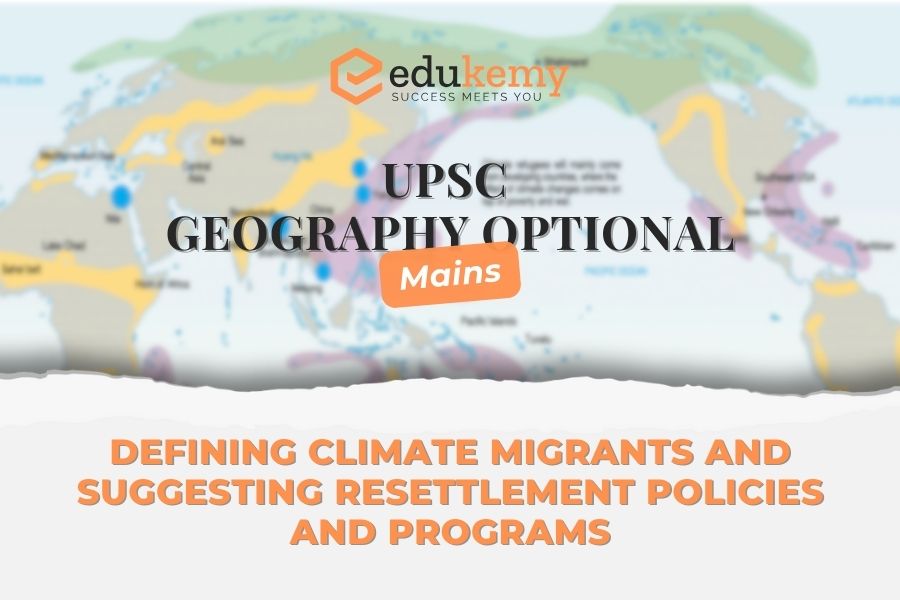
Explore the concept of climate migrants, individuals forced to relocate due to environmental changes such as rising sea levels, droughts, or extreme weather events. Climate migrants face unique challenges requiring tailored policies and programs for resettlement. Effective strategies may include implementing land-use planning measures to mitigate environmental risks, providing financial assistance for relocation and housing, and fostering community integration through social support networks. Additionally, investing in sustainable development initiatives and resilient infrastructure can enhance the adaptive capacity of affected communities. By addressing the needs of climate migrants and prioritizing their resettlement, policymakers can mitigate displacement-related vulnerabilities and promote equitable, sustainable solutions to climate-induced migration. Delve into the complexities of climate migration and explore innovative approaches to support affected populations in building resilient futures.
Contents
Answer:
Introduction:
Climate migrants are individuals or communities forced to leave their homes due to the adverse effects of climate change, such as sea-level rise, extreme weather events, drought, or loss of agricultural productivity. Their displacement poses significant challenges for both the migrants and the receiving communities.
Body:

Developing appropriate policies and programs for their resettlement is crucial to ensure their well-being and integration into new environments.
- Legal Framework:
- Establish legal frameworks at national and international levels to recognize and protect the rights of climate migrants, ensuring access to basic services and opportunities.
- Example: Bangladesh has enacted policies to recognize climate refugees and provide them with basic rights and support.
- Social Integration:
- Implement programs to facilitate the social integration of climate migrants into host communities, promoting cultural exchange and mutual understanding.
- Example: Canada’s refugee resettlement program provides support for language training, job placement, and community integration.
- Housing and Infrastructure:
- Develop affordable housing and necessary infrastructure in areas prone to climate migration to accommodate displaced populations.
- Example: The Netherlands invests in flood-resistant infrastructure and housing to mitigate the impacts of sea-level rise and accommodate climate migrants.
- Livelihood Support:
- Provide training, education, and job opportunities to climate migrants to enable them to sustain themselves economically in their new environments.
- Example: The Kiribati government offers vocational training programs for displaced individuals to develop skills suitable for alternative livelihoods.
- Environmental Resilience:
- Promote environmental resilience in both sending and receiving communities through sustainable land management practices and climate adaptation strategies.
- Example: The United Nations Development Programme supports projects in vulnerable regions to build resilience to climate change impacts, reducing the need for migration.
- Healthcare and Well-being:
- Ensure access to healthcare services and psychosocial support for climate migrants to address their physical and mental health needs.
- Example: Australia’s migrant health policies prioritize access to healthcare services for refugees and asylum seekers, including mental health support.
- Education and Skills Development:
- Invest in education and skills development programs for climate migrant children and adults to empower them for future opportunities.
- Example: Sweden’s education system provides comprehensive support for migrant children, including language classes and integration programs.
Conclusion:
By adopting policies and programs that prioritize their rights, well-being, and integration, we can build more resilient and inclusive societies capable of confronting the challenges of climate-induced displacement effectively.
Looking ahead, continued collaboration between governments, civil society, and international organizations is essential to ensure the successful resettlement and adaptation of climate migrants in a rapidly changing world.
In case you still have your doubts, contact us on 9811333901.
For UPSC Prelims Resources, Click here
For Daily Updates and Study Material:
Join our Telegram Channel – Edukemy for IAS
- 1. Learn through Videos – here
- 2. Be Exam Ready by Practicing Daily MCQs – here
- 3. Daily Newsletter – Get all your Current Affairs Covered – here
- 4. Mains Answer Writing Practice – here

